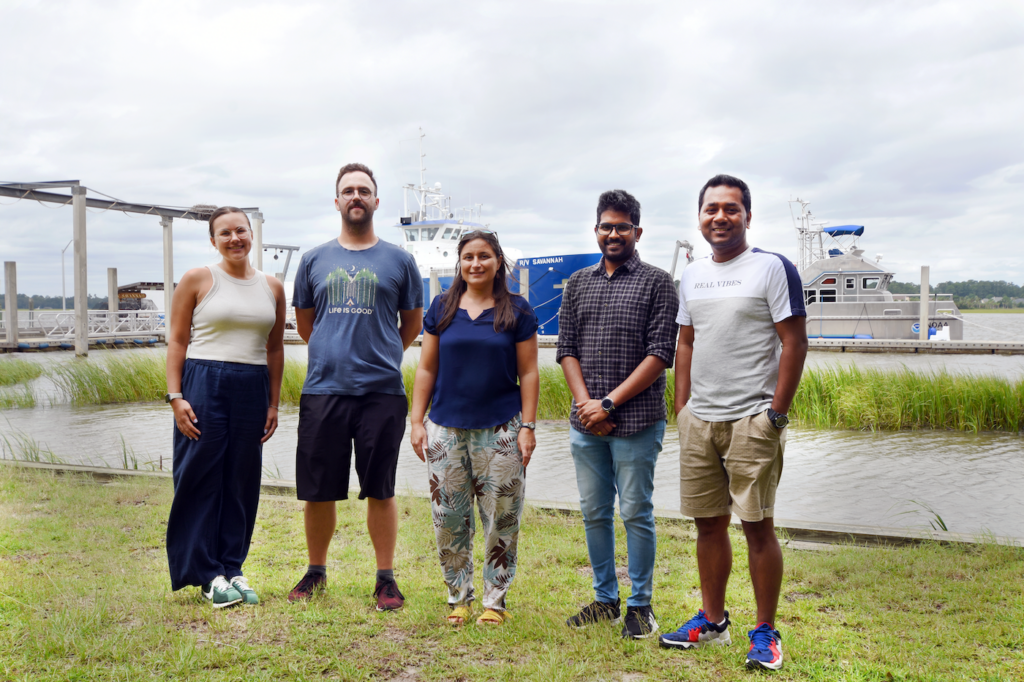
UGA Skidaway Institute of Oceanography (SkIO) faculty member Sara Rivero-Calle, along with four members of her lab, will travel to the Canary Islands, Spain, this fall to present research at the bi-annual Ocean Optics Conference, which will run from Oct. 6-11 and be held at the Palacio de Congresos.
Rivero-Calle’s lab members include post-doctoral researcher Srinivas Kolluru, doctoral student Ben Lowin, doctoral student Md Masud-Ul-Alam and master’s student Ashley Ohall. The Rivero-Calle Lab focuses on optical and satellite oceanography, which involves studying how light is absorbed, scattered and reflected by water and other materials in the ocean. Satellite remote sensing products such as chlorophyll concentration are built on these optical processes. The field gives insight into the health of marine ecosystems, water quality, water dynamics and more.
Presentations
Sara Rivero-Calle, assistant professor
Rivero-Calle will be presenting a poster on her work using ocean color methods to track the ocean’s internal waves. Her work, titled “Chasing Internal Waves with Ocean Color Methods,” combines results of a satellite algorithm designed to detect internal waves that was developed by a former Fulbright master’s student Francisco Silva, who visited the Rivero-Calle lab in 2022, with her team’s recent fieldwork in Croatia, where they sampled during a recurring internal wave event, in collaboration with Dr. Zrinka Ljubešić’s team from the University of Zagreb.
“This is one of my favorite meetings to attend,” said Rivero-Calle. “I am proud of all the interesting and diverse ocean optics projects going on in my lab and thankful to the meeting organizers for providing travel awards to my group so that all my students are able to attend and present their work.”
Srinivas Kolluru, postdoctoral researcher
Kolluru will be presenting a poster on his work assessing the accuracy of data collected by the SeaHawk/HawkEye satellite. This satellite mission was co-managed by the Rivero-Calle Lab, the University of North Carolina Wilmington, NASA and AAC Clyde Space. Kolluru’s work compares the satellite data to data collected by ground-based instruments (AERONET-OC) and data collected by members of the Rivero-Calle Lab in Georgia’s coastal waters.
Kolluru is also a member of the Ocean Optics Conference’s organizing committee. In this role, Kolluru helped review abstracts and select candidates for various levels of presentations at the conference.
“As a part of the organizing committee, I gained a lot of insight into the workings of the planning of a conference,” said Kolluru. “It is a great experience to be part of a planning committee. The committee is a pool of diverse research personnel with varying levels of experience, including early career researchers, like me, to full professors.”
Ben Lowin, doctoral student
Lowin will present a poster on matching up data collected by ocean gliders with that collected by high resolution satellites, specifically SeaHawk and the European Sentinel satellites. The poster will address the challenges of validating satellite data with glider data and propose recommendations for the community on how to improve.
“I’m looking forward to meeting up with collaborators in the Canary Islands who have worked with me and sent data,” said Lowin. “I’m looking forward to getting together with old friends and continuing to network with people in our field to better understand where our field is going and how it is expanding.”
Md Masud-Ul-Alam, doctoral student
Masud will present a poster on his work building a hyperspectral algorithm to monitor suspended sediments in the ocean. His current goal is to develop an algorithm customized for the South Atlantic Bight region, which includes the waters of coastal Georgia.
“I’m looking forward to collaborating and making new friends in the same field,” said Masud. “I’m also looking forward to getting some feedback from scientists on my project.”
Ashley Ohall, master’s student
Ohall will present research on her work advancing capabilities to identify microplastics in the ocean from satellites, aircrafts, drones and other devices used for remote sensing. Specifically, Ohall will present on a novel hyperspectral backscattering instrument, which she is using to develop a library of data that can then be used to train an algorithm to accurately detect microplastics in the ocean, from space, and determine which type of plastic they are — separating styrofoam from polyethylene, for example.
“I’m looking forward to receiving feedback from the community on my current and future work,” said Ohall.
About SkIO
The UGA Skidaway Institute of Oceanography (SkIO) is a multidisciplinary research and training institution located on Skidaway Island near Savannah, Georgia. The Institute was founded in 1967 with a mission to conduct research in all fields of oceanography. In 2013, SkIO was merged with the University of Georgia. The campus serves as a gateway to coastal and marine environments for programs throughout the University System. The Institute’s primary goals are to further the understanding of marine and environmental processes, conduct leading-edge research on coastal and marine systems, and train tomorrow’s scientists. For more information, visit www.skio.uga.edu.


